Mattress Upholstery
June 2020Mattress detailing; how to spot a great mattress
Updated 2020: Mattress detailing is the first sales opportunity a mattress has to show off its quality. Visual details will give you clues towards how suitable the mattress is based on its quality. However, if you don’t know how to spot the fake from the sublime then this potential window dressing could cause you to make a costly mistake. We explain everything you need to know about mattress covers and details to be able to see exactly what to look for in a new mattress.
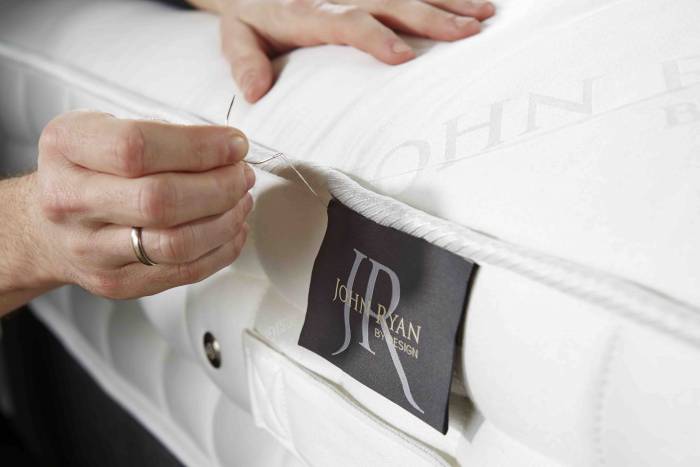
What is mattress detailing?
These are the visual finishing touches to a mattress that can indicate quite accurately the potential value of a product. These are all little clues to tell you whether a particular model is worth investigating further or whether it is obviously just a bag of springs. At this stage, you do not even have to know what upholstery is used within the mattress. Spotting what is used on the outside will tell you instantly which price range that particular model should fall into.
Examples of mattress detailing include:
- Tape edging
- Hand Side Stitching
- Tufting
- Cover materials
- Stitching types
This section is obviously quite extensive but well worth your time in reading through thoroughly. It is full of the things that should set your inner alarm bell ringing as some manufacturers may be flogging cheap mattresses with the impression that they are more than what they actually are “the red herring“. Fascinating stuff indeed!
Finding a quality bed with mattress detailing
Mattress detailing can be broken down into just five areas. Knowing what’s what will instantly tell you whether it will be worth the price attached to the product:
The tricky thing you will have to do is to evaluate all these aspects as a whole and not specifically take them on individual features. For instance, on a mattress that can be considered ‘High End’ you will not find a knitted fabric that has been quilted and you will not see the side panels having a mock side stitch (known as machine side stitching) and you will not see the mattress sitting on top of a base that is just a fabric covered wooden frame with plastic wheels.
Anyone of these aspects will put the mattress into a particular category, but as there are so many price categories (too many to even mention) you will have to decide which aspects you can live with to fit into your particular budget.
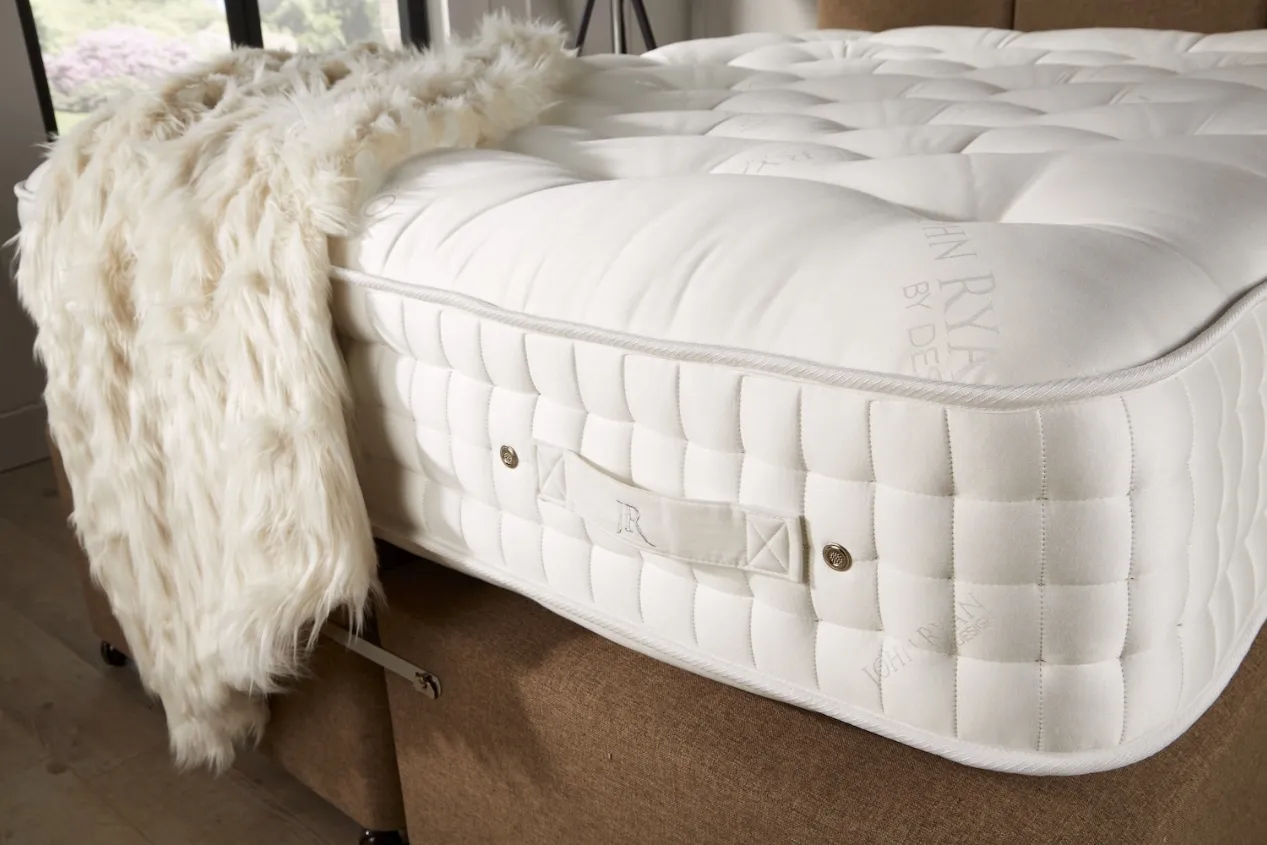
This is to say that if you are being charged £1000 or so there are aspects of the build that you should be expecting to receive for this price and likewise if you are on a low budget say less than £500 there are aspects of the build that you cannot reasonably expect to get.
If we look at these aspects in a little more detail we can put them into some sort of order to show you what you can reasonably expect to get and some that may be unlikely for a particular budget. Once you know what is deemed a high end finish you will be able to tell whether the mattress you are looking at has a particularly high standard of finish for the price you are being asked.
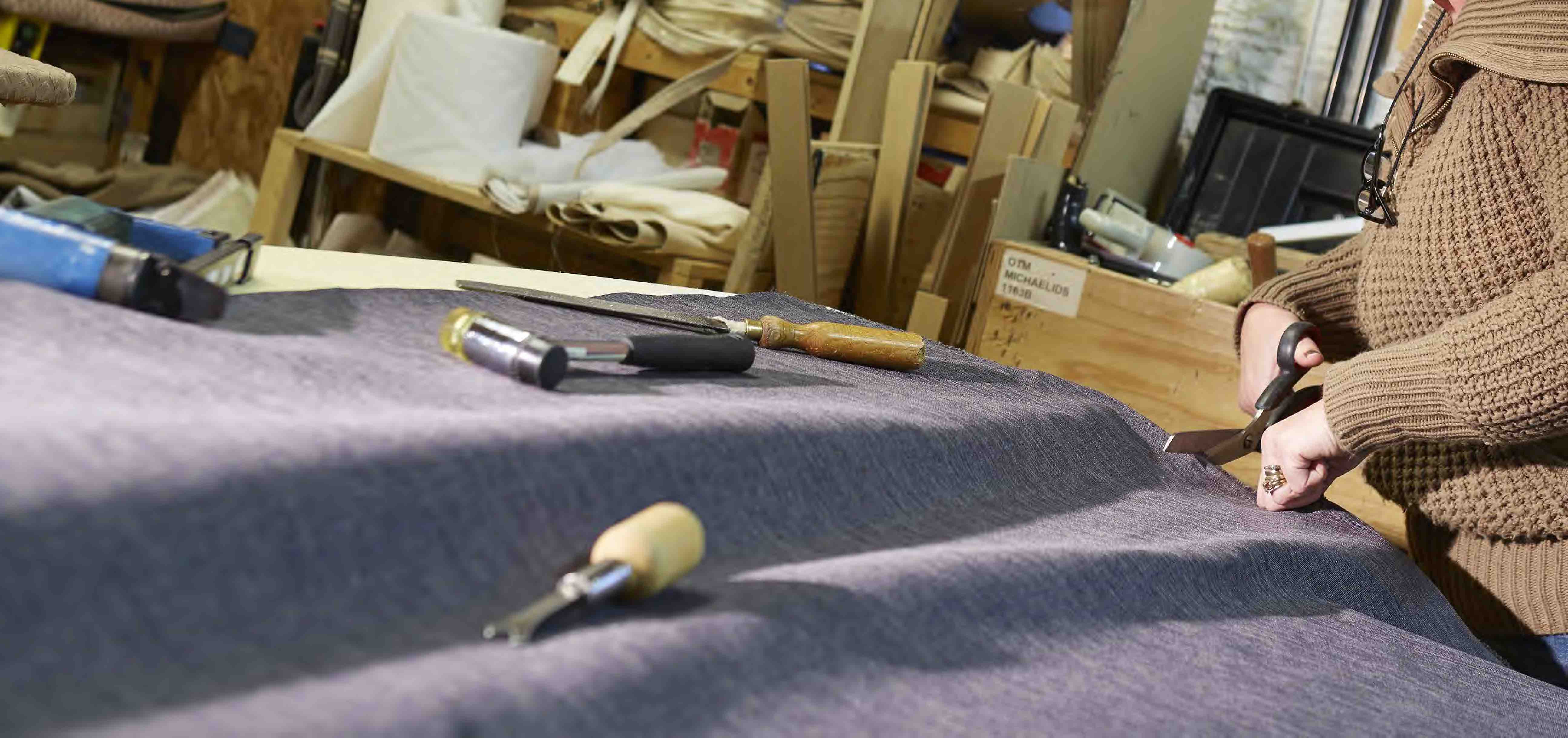
All of our mattresses are hand made. When looking for a mattress always ask the retailer which parts are machine made vs hand made.
1. The Fabric
There are three types of fabric used as a mattress cover.
- Woven (high end)
- Knitted (mid-range)
- Stitchbond (low end)
Woven fabrics are ‘generally’ high end and knitted fabrics, see example here, are low to mid range. However, fabrics should certainly not be taken at face value. There are good quality knits for example and there are low-quality weaves. This subject is explained in greater detail by following the link but for the sake of the example that is coming up, we will assume we are looking at the general differences between very good and acceptable.
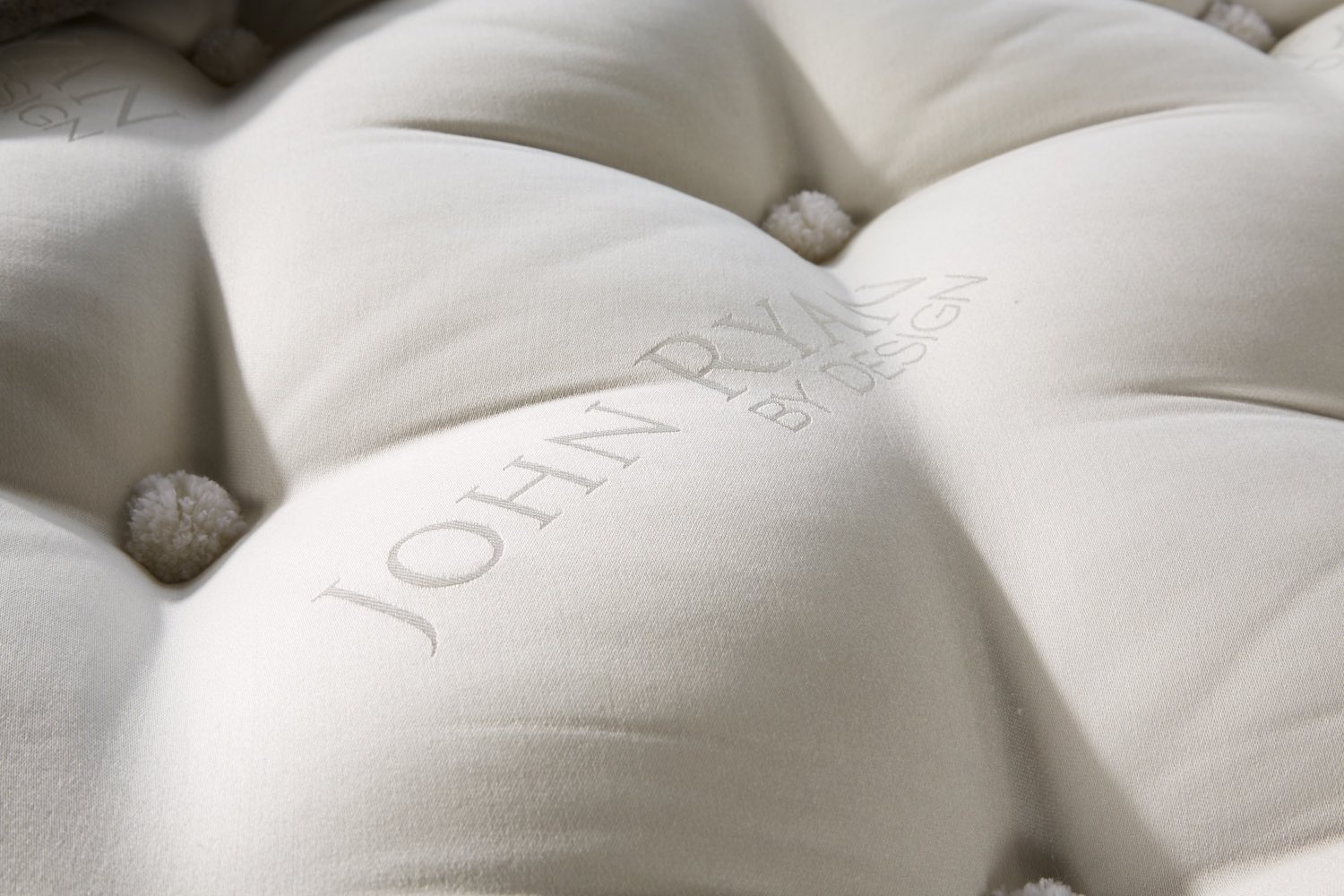
Stitchbond is the lowest grade of fabric. Rough to the touch and always blatantly obvious by the gaudy design that is printed on them. This fabric will often be found on the less than £100 mattresses with open coil springs. No need to discuss further, I’m sure you know what I mean.
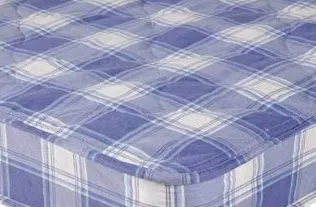
2. The Side Stitching
There are two types of side stitching: Hand side stitched (HSS) and machine side stitched (MSS). This refers to how the side panel on the mattress is finished.
Hand side stitching is a labour intensive process that attaches the side panel to the pocket springs within the mattress which gives the mattress enhanced edge support.
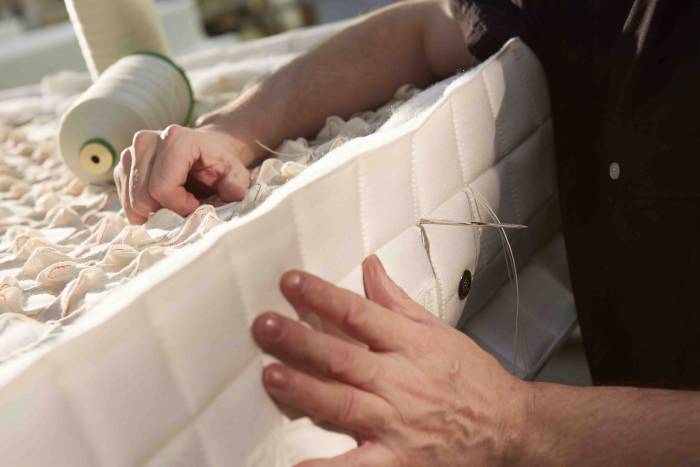
Machine side stitching is just an ‘illusion’ of HSS, it is just the side panel fabric that has a stitching pattern that looks like HSS but with absolutely no support qualities whatsoever. Mattress descriptions will state ‘side stitching to enhance edge support’ which is absolutely ludicrous. The best way to determine whether it is machine side stitched is if you press down on the edge the side panel will bulge out. This does not happen with HSS, However, genuine HSS should really be obvious just by looking at the mattress.
Two rows of HSS is enough to do the job it is supposed to do, three is slightly better. More than this is showing off and completely unnecessary but has to be done in order to fit into certain price points ie. High End. You will be paying top whack for the mattress and 4 rows and 5 rows have to be added to justify the price.
Mattress with three rows of genuine hand side stitching
Mattress with 2 rows of machine side stitching
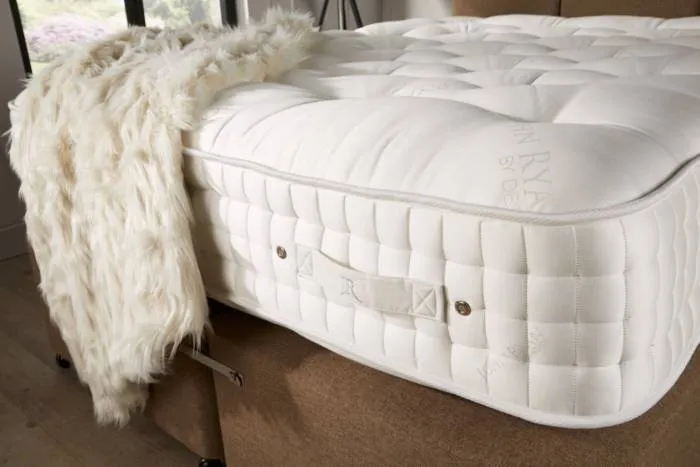
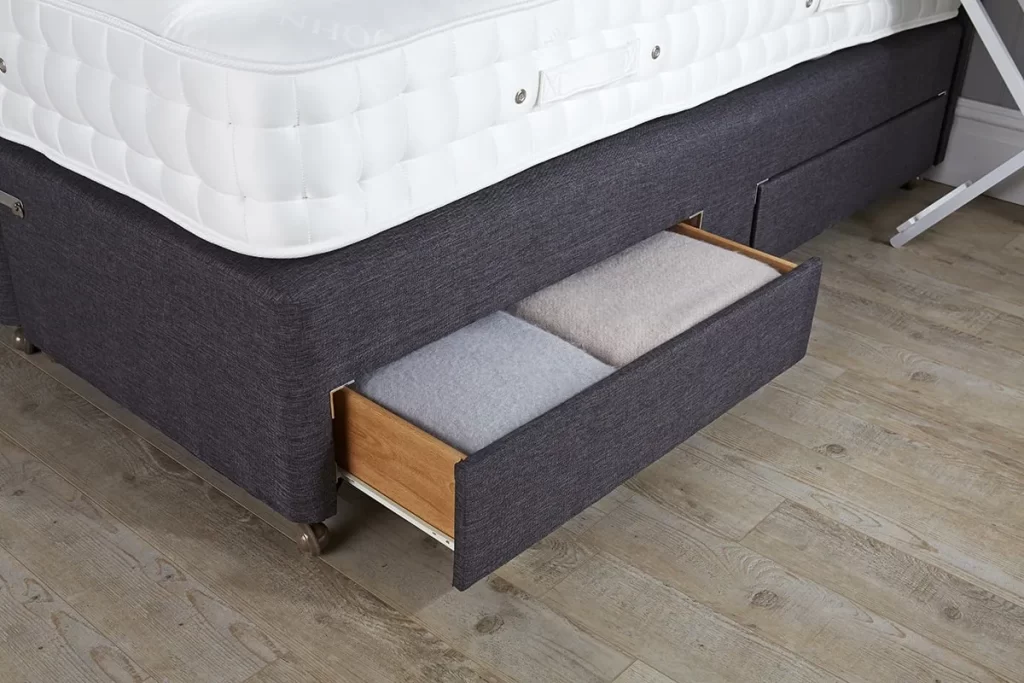
Quilting designs
Whilst we are on the subject of side panels the following images show you two different designs of quilted panels. This type of finish is predominately found on low-priced mattresses. There is nothing special about them at all, they are just stitching designs and the following two are the most common.
Quilted designs are also common in mid point mattresses
These are usually polyester based and then padded with more polyester stuffing
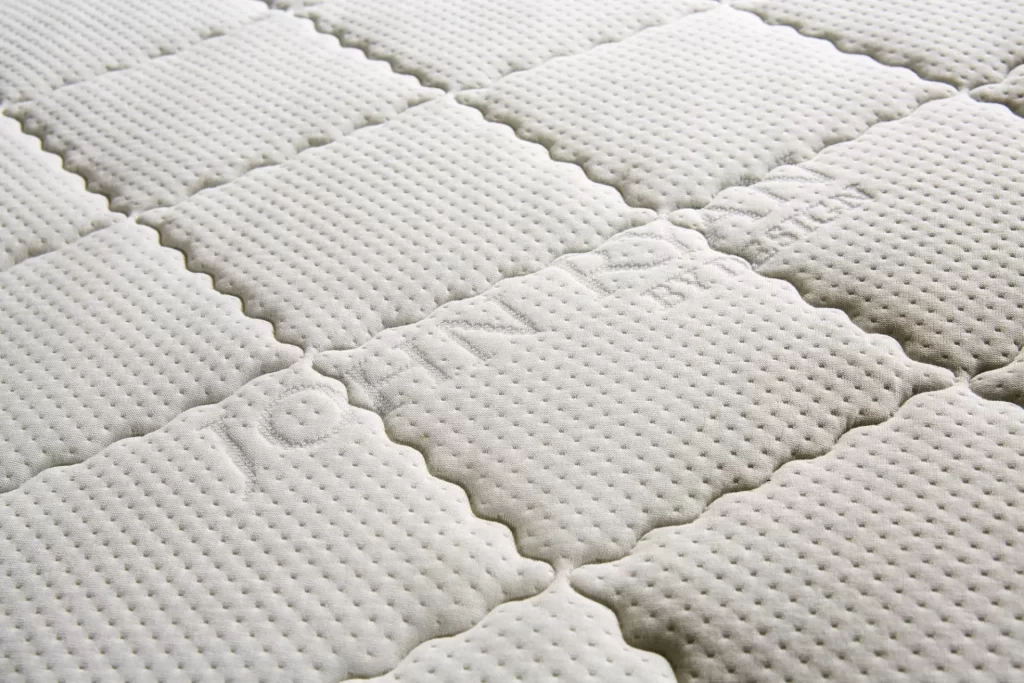
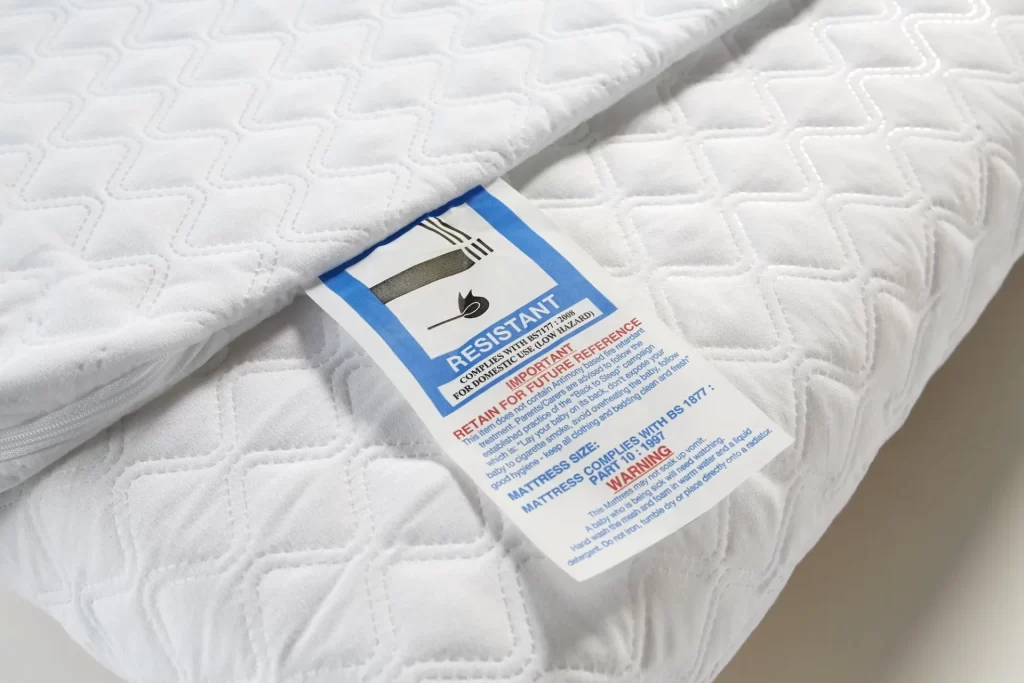
3. The surface finish of a mattress
There are four types of mattress surface finish:
1. Traditional hand tufting
2. Quilting – light or deep
3. Pillowtop
4. Box top
Traditional Hand Tufting on Mattresses
The finish can be an absolute instant give-away as to the actual worth of a mattress. For instance, it can generally be taken as a given that there is no way a high-end mattress will have anything other than a tufted finish. No way will it be quilted and in most cases, it will not have a pillowtop.
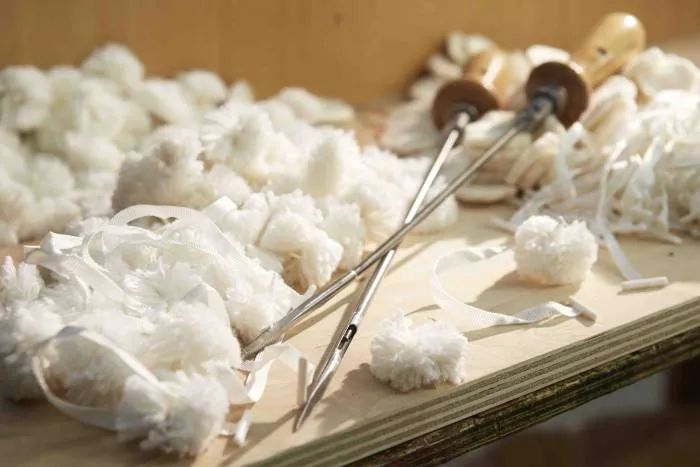
Hand tufting is the traditional finish you are familiar with – the ‘buttons’ that keep the internal upholstery stable. These tufts can either be felt washers /pom poms/woollen tufts, there is no standard and all are acceptable. Obviously, even the cheapest of cheap mattresses can be tufted, the point I am trying to make is those mattresses that can be deemed high end will not be quilted.
Quilted mattress cover below
Hand-tufted mattress
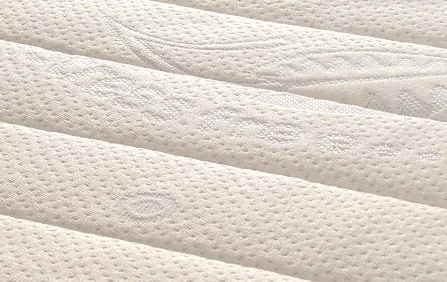
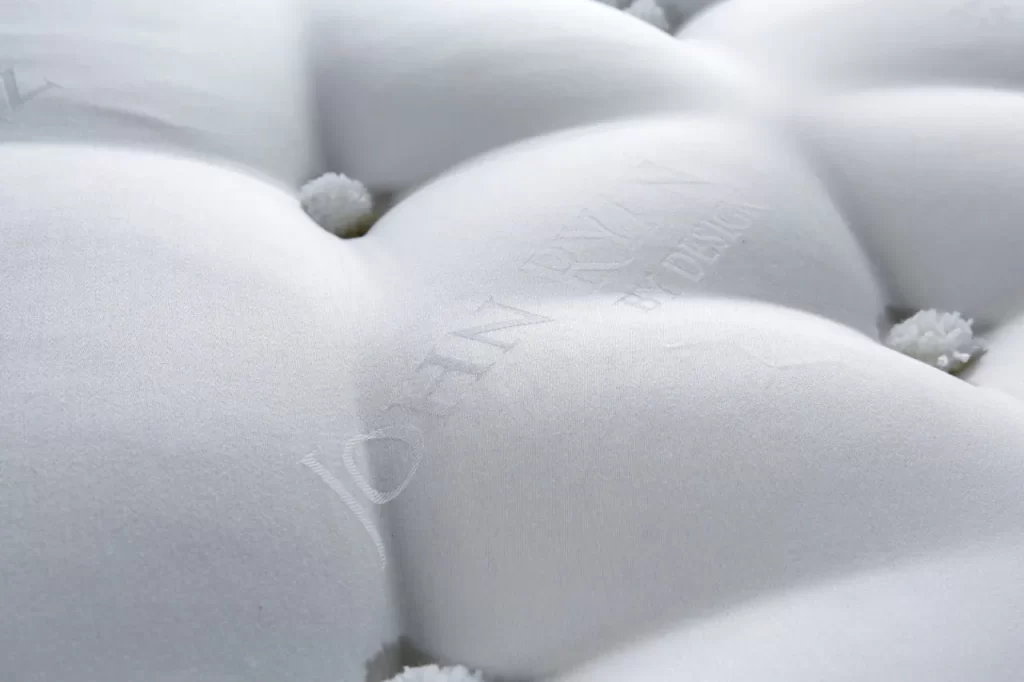
It has to be said that the term ‘traditional hand-tufted’ is slightly misleading. This term should really be for the realms of Savoir beds where the tufting is actually done by hand, and twine is used by the artisan to gauge the actual tension. In
99% of all other cases, a machine compresses the mattress and pre-determined lengths of ‘tuft’ (known as jiffy ties) are inserted through the mattress.
Quilting on Mattresses
This done by a very large sewing machine and it is this particular method of finish that will explain to you why there are so many different model names of mattresses out there (in excess of 4000 by the way). In general terms, quilting is the process of stitching the outer fabric to a layer of wadding directly beneath the surface fabric. This wadding is usually polyester which indicates that the value of this particular mattress will either be low end or mid-range certainly cannot be deemed a high-end mattress.
The number of wadding layers that can be quilted to the outer fabric can be as much as the entire upholstery layers within the mattress. The automated machine is making the entire mattress ‘top panel’, ready to be placed on the spring unit and then stitched to the side panels and Bang, you have a mattress.
The number of designs this machine can produce is well into the hundreds, diamonds/squares/circles/shamrocks/smiley faces, anything! With so many quilting designs being produced you as a consumer are completely unable to tell one mattress from the other in a store or competing stores even though the internal components are identical. This is the main reason why upholstery details are rarely given in full and in detail. For if you actually knew this, you would be able to see that the only difference between hundreds of mattresses models is just the fabric colour and quilting design and, by the way, this is no exaggerated figure).
Pillow top box Mattresses
This is just a design feature which makes the mattress look as though there is a topper attached to the mattress. Pillowtops look like a pillow, box tops look like a, you guessed it, box top!
Pillowtops are an extremely flawed design. This is fundamentally a cheap mattress made to look like something quite special. There is no mistaking that visually it will look quite impressive, but look under the hood so to speak and you will soon realise it is all smoke and mirrors. They are always going to be one-sided (cheap) and the pillowtop will usually (there are very few exceptions) be a majority polyester-based upholstery layer. If you have read the post all about polyester you will now know that besides being the cheapest upholstery component used it does not have a particularly long lifespan. So once the pillowtop element of the mattress becomes depressed (not sad and forlorn but indented!) you will be sleeping in a hollow and out looking for a new mattress a lot sooner than you need to.
Typical Boxtop (Left)
Typical Pillowtop like the Premier Inn Mattress (Right)
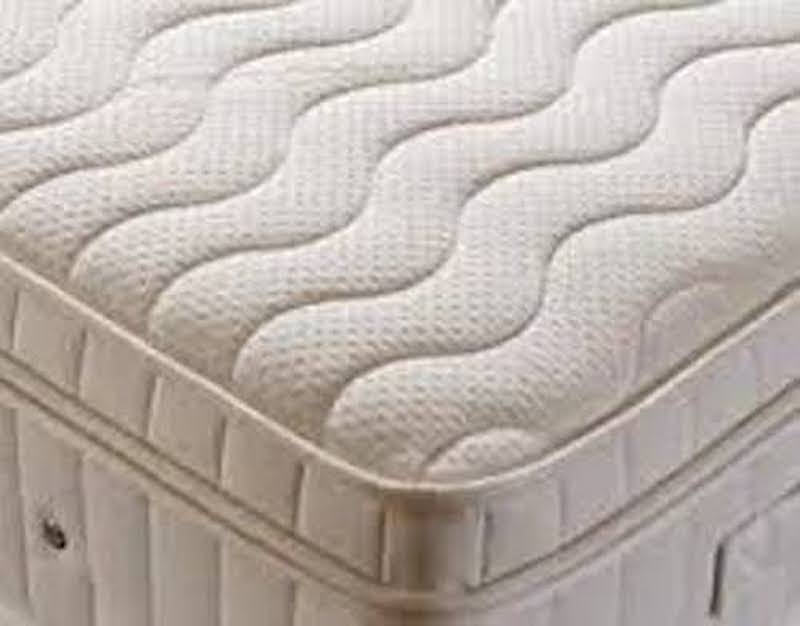
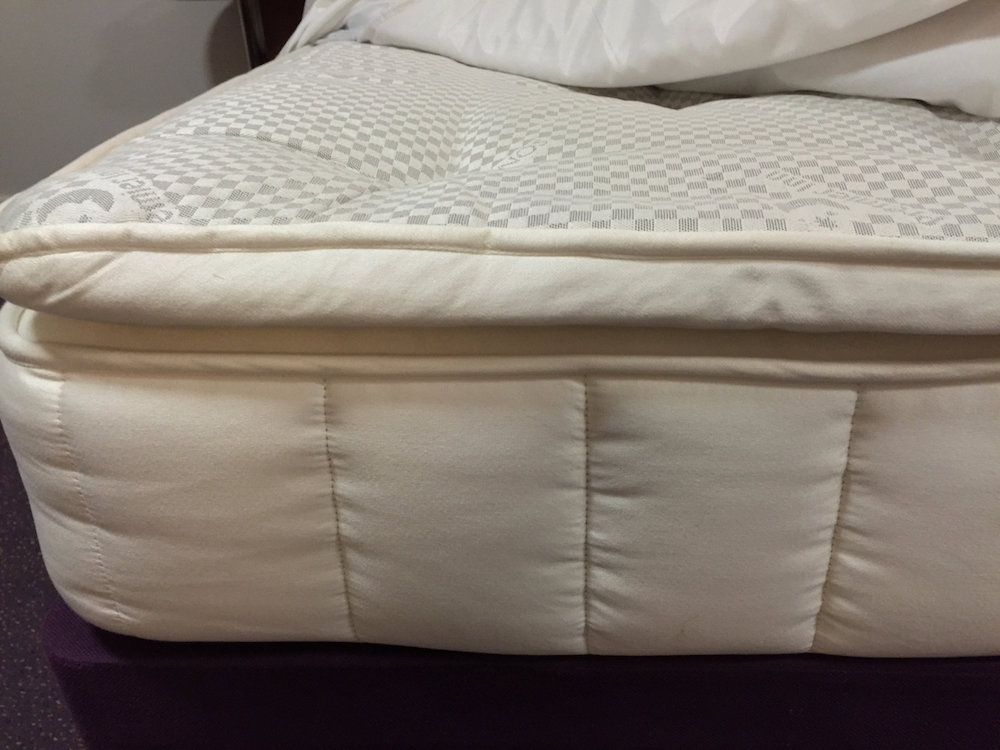
The alternative and logical solution to a pillowtop mattress is to purchase your mattress and a topper separately. This way you can replace the topper when nightly wear and tear takes its toll and the underlying mattress will have years of life left in it. Incidentally, a topper should be a necessary addition to all mattresses no matter how much you pay for them.
Box topped mattresses
In the majority of cases, these will be using either memory foam or synthetic latex as the primary layers. The effect of a box of upholstery sitting on top of the mattress is just a design detail and is usually a trim of piping on the side panel fabric. Again these will be one-sided mattresses.
4. The mattress build
This is either going to be a one-sided mattress or a two-sided mattress. Despite the simplicity of this choice, there is a lot to consider. There is a separate post detailing this subject here. In short, there is never going to be a mattress that can be considered high end that will be a one-sided mattress. These fall within the very low to mid-price ranges. The mid-price models should really have more than polyester as the primary comfort layers and realistically should be in the memory foam or latex categories.
You may also see summer and winter mattresses. Where each side has a different arrangement of fillings. One side is claimed to be cooler than the other. However, it can lead to unnecessary settlement and completely different feels on each side of the mattress. Leading you to stick to the side you prefer the most, hence only ever using one side.
If you’re looking for a cooler mattress then you’re better buying a 100% Natural Fibre model instead (with the same upholstery on each side). You can then always help cosy up the bed in winter with a winter duvet. It will ensure you get a longer lifespan out of your mattress and is an easier tweak than a summer/winter or seasonal mattress.
5. The Base
The base is a good indicator of the overall quality of the mattress. A cheap mattress will have a cheap base nothing more than a standard platform top divan that feels light and rough around the upholstery underside. Mattresses that can be considered mid to high end will be partnered with a sprung edged divan that is significantly upholstered.
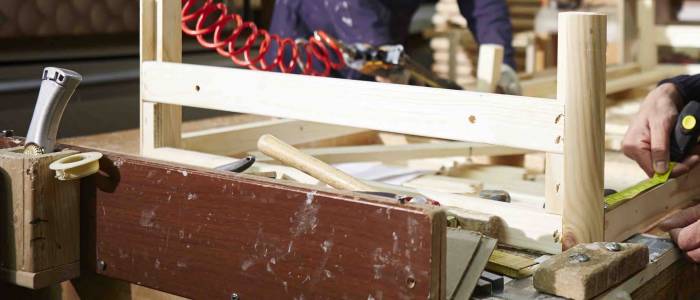
The wheels or castors on the base is an indication of the quality and worth of the base. Flimsy wheels are the cheapest and indicate that the cost (and therefore build quality) are being kept down. Whereas shepherd Castors are the best and indicate a truly well-made mattress base. Plastic wheels/rollers will be found on the primarily low end or mid-range.
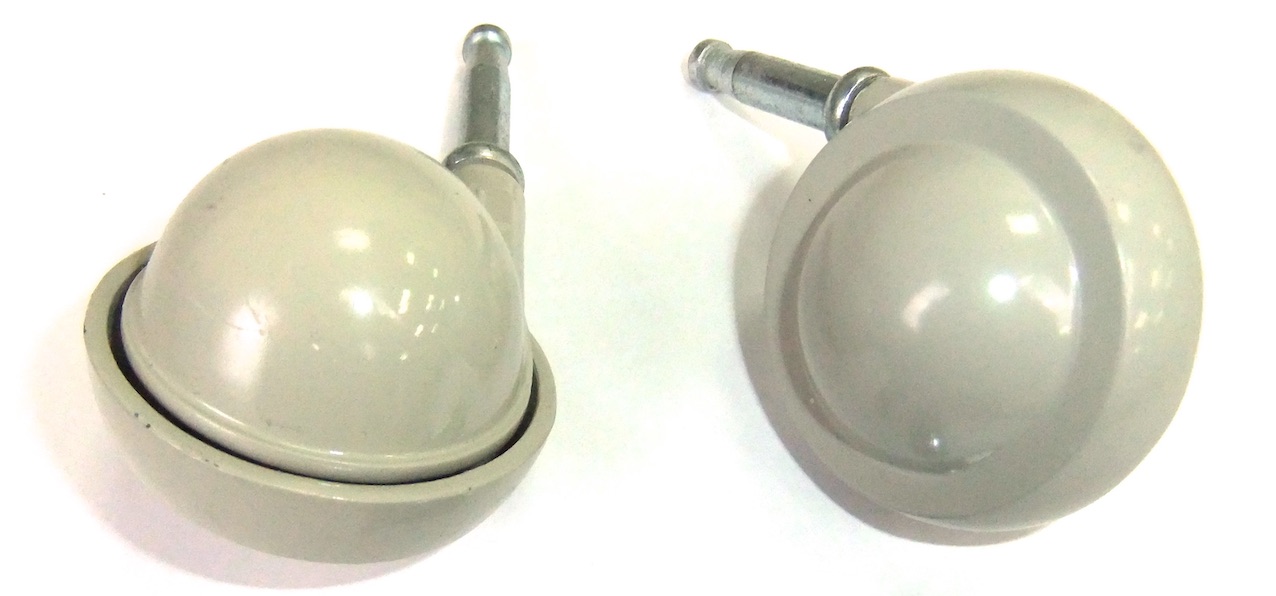
The fabric that surrounds the base is not lined on cheap bases. On mid to high-end bases, they are lined with polyester or other suitable lining material. The Base tops themselves will either be completely upholstered same as the sides (very high end). Part upholstered which takes in about six inches around the perimeter on the top of the base or just upholstered on the sides leaving the entire base top covered in a cheap plain stitchbond material.
Mattress showrooms are akin to Supermarket shelving
When it comes to mattress showrooms you need to be prepared to know what you’re looking for. Just like the supermarkets where milk, coffee, bread, sugar, gin, tea etc are never together. The Showrooms are designed around the same thesis. It is known as ‘the walk’, the cheapest and most uncomfortable mattress is at the front, the first one you will really be expected to try. Obviously, this will not be good enough and so through the shop, you meander to eventually reaching the expensive and most desirable models at the back.
Realistically and logically, the models should be placed in price order from low to high from various manufacturers – this way you can go straight to your intended budget and see from a simple range what it can get you. So why is this never the case?
Most showroom mattresses are very similar beneath the covering
Going back to the quilting method above we know that the bulk of all mattresses within a showroom are intrinsically the same. This site tells you in great detail that there are only so many combinations of spring, support and upholstery you can get. Certainly not enough to fill a showroom as big as Dreams et al. So there has to be a considerable element of similarity between most of the mattresses you will be looking at. Each manufacturer will be vying for the intended sale so it will not be them who are setting the prices and they will certainly not be overcharging the retailer for a product if a manufacturing competitor is offering a similar or better-built mattress for a lower price.
Why don’t retailers tell you exactly what is in their mattresses?
So let us take it for granted that if ten manufacturers have similar priced, products on sale in a showroom – putting them side by side will instantly show you which manufacturer is offering the best value product – particularly if they tell you ‘What’s precisely under the hood’ – which the retailer, in particular, will certainly don’t want you to know!
That is why you really need to also know the following (click them for detailed articles to each).
Summary
There’s an awful lot to digest on the topic of mattress detailing. Whether it be the finish of the fabric, the tufting used, box or pillowtop, whether it’s one or two-sided not to mention the base the mattress is put on. If you need more help please contact us, or if you have read through all the information above why not visit our shop? Here you can put your newfound mattress expertise to good use browsing all the detailed breakdowns of our mattresses.
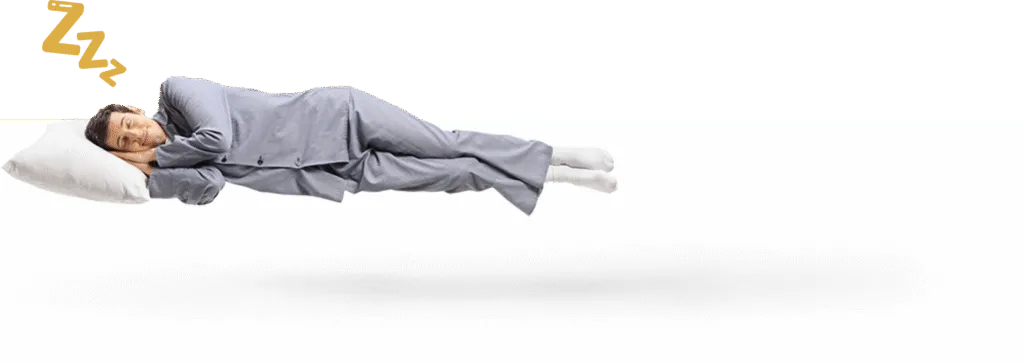
Dreaming of the perfect nights sleep?
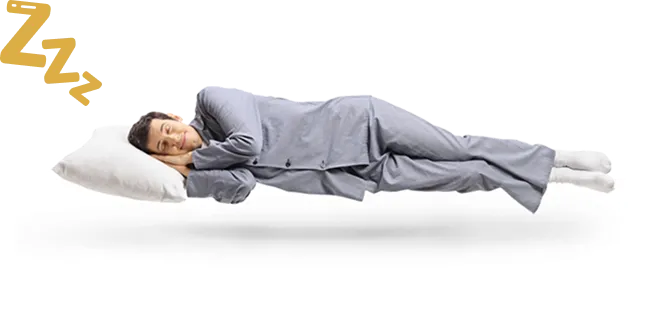
Ask us a question
There are over 6000 questions and answers submitted by you on all questions about mattresses and bed problems. Enter a keyword such as Vi Spring, John Lewis beds, bad back or Memory Foam and see if your question has already been answered.
If you can’t find an answer in knowledge hub, ask a new question. We aim to respond to all questions within one working day.
Newsletter
Enter your email to join our newsletter. We’ll send you occasional news and mattress expertise.
